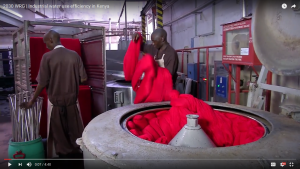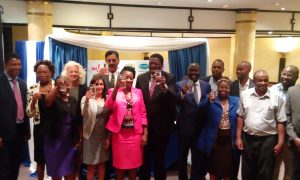Kenya Industrial Water Alliance brings partners together to create a water-smart future
PRESS RELEASE – for immediate release

Nairobi, Kenya. 29 September 2016—The Kenya Industrial Water Alliance, or KIWA, launched today following a commitment from twenty-three private-public-civil society partners to collectively address water-related risks to industrial growth, initially in the Nairobi Sub-catchment. The partnership provides a platform to discuss and implement activities aimed at increasing sustainable access to water with a focus on ground water management, industrial water use efficiency and improved surface water quality management.
A key sector in the Kenyan economy, industry contributes 21 percent of national gross domestic product. The country’s strategic development plan, Vision 2030, aims to develop the sector further by creating a robust, diversified, and competitive manufacturing sector expected to contribute an additional 10 percent to GDP. As industry expands to accommodate the growing economy, so too will demand on the country’s water resources.
If Kenya maintains a “business-as-usual” approach to managing its water resources, by the year 2030, there will be a 30 percent gap between water demand and practically available supply. Water supply in Nairobi today is estimated to be 20 percent below total demand. If current trends continue, this deficit is expected to be more than 60 percent by 2035. Although decreasing ground water levels, flooding, catchment area degradation, and uncontrolled waste disposal further risk jeopardizing the sustainability of the city’s expansion, initiatives like this provide hope for urban communities who in the past have suffered due to pollution associated with industrial expansion.
While helping launch the new partnership, Cabinet Secretary, Kenya Ministry of Water and Irrigation, Eugene Wamalwa stated, “Private companies in Kenya are increasingly recognizing that availability and quality of water poses a substantial risk to current and future operations and are seeking ways to mitigate that risk. We are therefore working with the private sector and civil society to collaboratively develop action oriented solutions to address industrial water management.”
Treatment and reuse of waste water from industry further provides an opportunity to reduce the amount of water abstracted, as well as replenish both ground and surface water resources. This will require not only investment, but involvement of both private sector and civil society to support the government’s management at national and county levels.
KIWA Chair and CEO of Kenya Association of Manufacturers, Phyllis Wakiaga, added, “Just as local industry has mainstreamed energy efficiency into its operations, it must similarly improve industrial water productivity by adopting more efficient water practices and technologies. Solutions to Nairobi’s unique water-related challenges can only be found through strong involvement among public, private and civil society players. This alliance creates an opportunity to properly engage in a way that did not exist before.”
 With 98 percent of available freshwater stored in underground aquifers, Nairobi’s water management success will be largely based on preserving such resources. A recent assessment of boreholes in the Nairobi Metropolitan area revealed a doubling of “known” boreholes between 1995 and 2011. Of over 3,500 boreholes located in Nairobi County less than half have abstraction permits, two thirds are unmetered, and four in five users do not pay for water.
With 98 percent of available freshwater stored in underground aquifers, Nairobi’s water management success will be largely based on preserving such resources. A recent assessment of boreholes in the Nairobi Metropolitan area revealed a doubling of “known” boreholes between 1995 and 2011. Of over 3,500 boreholes located in Nairobi County less than half have abstraction permits, two thirds are unmetered, and four in five users do not pay for water.
Representative for the CEO of the Water Resource Management Authority, Engineer Boniface Mwaniki, stated, “Knowledge of the status of our aquifers and improved regulation and monitoring of ground water abstraction are essential to effective and sustainable management of the city’s available water resources.”
Jointly established by the International Water Stewardship Programme and the 2030 Water Resources Group, current KIWA partners include: Act!, Athi Water Services Board, Bidco Africa, Brookside Dairy Ltd, Coca-Cola, County Government of Kiambu, DOW Chemicals & Process EA, Grundfos, International Water Stewardship Programme, Kenya Association of Manufacturers, Kenya National Cleaner Production Centre, Kenya Private Sector Alliance, Kenya Water and Sanitation Civil Society Network, Nairobi County Government, Nairobi City Water and Sewerage Company, National Environmental Management Authority, Nestle, Republic of Kenya Ministry of Water and Irrigation, Spinners & Spinners, 2030 Water Resources Group, Water Resource Management Authority, Wetlands International, and Wrigley EA. Partnership discussions with additional partners are currently underway.
###
About the International Water Stewardship Programme
IWaSP is an international water security programme. It combines global best practices in water stewardship with local know-how. Currently active in seven countries, the programme facilitates partnerships between the public sector, the private sector and civil society to address shared water risks. The Deutsche Gesellschaft für Internationale Zusammenarbeit (GIZ) GmbH manages IWaSP on behalf of the German Federal Ministry for Econo-mic Cooperation and Development (BMZ) and the UK Department for International Development (DfID). For more information visit www.iwasp.org and www.giz.de/en/ or follow us on Twitter via @_IWaSP.
About the Kenya 2030 Water Resources Group
The 2030 WRG is a global public-private-civil society partnership which facilitates open dialogue to drive actions necessary to close the gap between water demand and supply by the year 2030. Kenya’s 2030 WRG partnership aims to improve the use of water across all key economic sectors to close the gap by: improving agricultural water productivity; strengthening urban and industrial water efficiency and reuse; and creating new financing mechanisms for both water supply expansion and improved demand management. For more information, please visit www.2030wrg.org.
- Please also see our Kenya country page on the latest developments in our work.
- See our latest Kenya videos on our partnership and current work streams.
Media contact:
Kimberlee A. Brown
Regional Communications
2030 Water Resources Group
+254 703 485 425
kbrown@ifc.org

